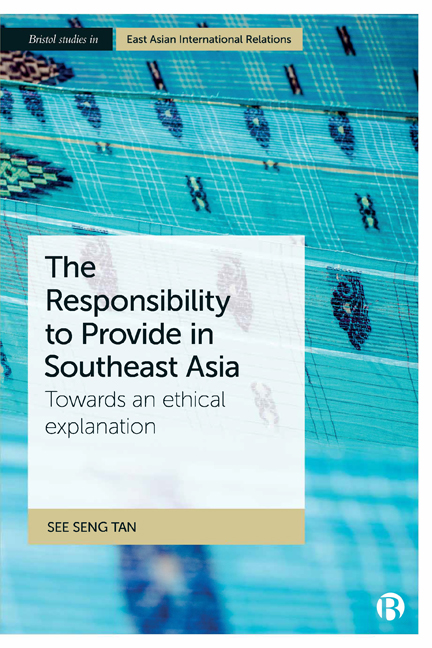Book contents
- Frontmatter
- Dedication
- Contents
- List of Tables
- List of Abbreviations
- Acknowledgements
- 1 Towards an Ethos of Responsibility in Southeast Asia
- 2 The Responsibility to Protect (R2P) and Responses from Southeast Asia
- 3 Towards a ‘Responsibility to Provide’ (R2Provide) in Southeast Asia
- 4 Institutionalizing Security Regionalism: Responsibility as ‘Response Ability’
- 5 Responsible Provision in HADR, Conflict Management and Human Rights
- 6 Towards the Responsible Management of Disputes in Southeast Asia
- 7 Communitarianism, Liberalism and the Limits of Responsibility in Southeast Asia
- 8 Levinas and the Responsibility to Provide in Southeast Asia
- 9 The Responsibility to Provide: Implications for the Region and Beyond
- Notes
- Bibliography
- Index
8 - Levinas and the Responsibility to Provide in Southeast Asia
Published online by Cambridge University Press: 02 March 2021
- Frontmatter
- Dedication
- Contents
- List of Tables
- List of Abbreviations
- Acknowledgements
- 1 Towards an Ethos of Responsibility in Southeast Asia
- 2 The Responsibility to Protect (R2P) and Responses from Southeast Asia
- 3 Towards a ‘Responsibility to Provide’ (R2Provide) in Southeast Asia
- 4 Institutionalizing Security Regionalism: Responsibility as ‘Response Ability’
- 5 Responsible Provision in HADR, Conflict Management and Human Rights
- 6 Towards the Responsible Management of Disputes in Southeast Asia
- 7 Communitarianism, Liberalism and the Limits of Responsibility in Southeast Asia
- 8 Levinas and the Responsibility to Provide in Southeast Asia
- 9 The Responsibility to Provide: Implications for the Region and Beyond
- Notes
- Bibliography
- Index
Summary
Introduction
The aim of this chapter is twofold. Firstly, it explores the ideas of Emmanuel Levinas, whose concept of responsibility for the other arguably provides an alternative vision of sovereignty and subjectivity in Southeast Asia to communitarian and liberal ethics. As we established in the previous chapter, both those ethical systems hold to the axiom that responsibility is first and foremost to the self, which for Levinas represents a totalizing imperative that always and already relegates and reduces the other through the all-consuming insistence to privilege the self. Beginning with Levinas’ themes of hospitality, reciprocity and justice, the chapter also pays close attention to how sympathetic interlocutors of Levinas have engaged with and reinterpreted those themes in ways that render them more practicable and actionable – indeed, Levinas’ ideas can at times seem otherworldly, even excessively idealistic, a drawback which Levinas himself has acknowledged – but without diluting their substance or diminishing their power. Secondly, the chapter unpacks the ethical and political ramifications of Levinas’ ethics for the responsibility to provide (R2Provide) as expressed in the various manifestations of responsible sovereignty in Southeast Asia examined in Chapters 4‒6. In particular, Levinas’ ideas (re)define the terms of the relationship between responsible providers and their recipients in three key ways: one, the assumptions and expectations over one's extension of hospitality to one's neighbours; two, the rethinking of mutuality and reciprocity between providers and recipients; and three, the ways in which the considerations of justice (as understood by Levinas) play out within the diplomatic and security contexts of Southeast Asia and, at least where responsible provision is carried out through the ADMM-Plus is concerned, the broader Asia-Pacific.
We begin with Levinas’ ethics. The overarching leitmotif in his thought is that of responsibility: responsibility not to the self, but to and for the other. Responsibility for the other therefore comes before everything else; indeed, it is the very thing that renders thought possible at all (Derrida, 1992b: 92). For Levinas, ethics as ‘first philosophy’ is a highly problematic assumption because of the emphasis in Western philosophy – at least until that of Heidegger, to whom Levinas’ own work is indebted but which he also sought to transcend (Heidegger, 2010) – on presence and self, without consideration for the other except in instrumental or utilitarian terms, opens it up ironically (as we shall see later) to the possibility of tyranny and evil.
- Type
- Chapter
- Information
- The Responsibility to Provide in Southeast AsiaTowards an Ethical Explanation, pp. 153 - 178Publisher: Bristol University PressPrint publication year: 2019



